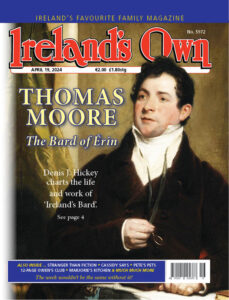Lord Byron said of him ‘Moore has a peculiarity of talent, or rather talents – poetry, music, voice, all his own; and an expression in each which never was, nor will be, possessed by another’. Denis J. Hickey charts the life and work of ‘Ireland’s Bard’.
Thomas Moore was born on 28 May 1779, the first of nine children to John and Anastasia Moore (née Codd). Six of their children died in infancy. The Moores lived over their wine and grocery business at 12 Aungier St., Dublin. Moore’s mother arranged singing, harpsichord and pianoforte instruction for her young son.
Thomas’s introduction to education when but four years of age was at the hands of a Mr Malone – a dipsomaniac who whipped his charges for interrupting his slumbers. Transferred to Samuel Whyte’s Grammar School, MoorE developed the elocutionary talents that influenced his later life. Here, he also studied Greek and Latin.
 He learned the piano while observing a Mr. Warren instructing his sister Kate in the instrument. In October 1793 Moore’s first published verse appeared in Dublin’s Anthologia Hibernica under the initials T. M.
He learned the piano while observing a Mr. Warren instructing his sister Kate in the instrument. In October 1793 Moore’s first published verse appeared in Dublin’s Anthologia Hibernica under the initials T. M.
On 2nd June 1794 Moore entered Trinity College, then a bastion of Protestant education, and into which Catholic access had been made possible through passage of the Catholic Relief Act the previous year – although Catholics remained excluded from scholar and fellowships. Despite such prescriptive Moore earned commendations in his first year.
At Trinity, he developed a friendship with leading United Irishmen including Robert Emmet. Although not a member, Moore wrote articles in the organisation’s support for the revolutionary paper The Press.
In April 1798 he appeared before a college tribunal to answer charges of sedition, but avoided the expulsion suffered by other Catholic students. He entered fully into life at Trinity and, literary contributions apart, became a popular speaker and debater. He left Trinity with a Bachelor of Arts degree in 1798.
In 1798 also, his father, now a barrack-master in London, sent his son to London’s Middle Temple to study law. Such a career was anathema to Tom and he soon tired of his studies. He had by now translated Odes of Anacreon from the Greek and saw it published in July 1800, dedicated to the Prince of Wales.
The Duke of Bedford, the Marquis of Lansdowne and Lord Moira became subscribers and encouraged influential friends to do likewise. Through Moira, Moore was introduced at Court and into fashionable society. A brilliant conversationalist and musical virtuoso in addition to his poetical gifts made Moore a welcome guest at the highest society gatherings.
He published a volume of lyrics entitled The Poetical Works of the Late Thomas Little Esquire in 1801 – the title was a pun on Moore’s own diminutive stature. Although the book was a success, Moore later regretted that some passages were ‘licentious in character’.
In 1803 he was offered the Registrarship of Bermuda’s Naval Prize Court. While captivated by the island’s allure, he found the work tedious and after seven months left the post in charge to his deputy.
Continue reading in this week’s Ireland’s Own


